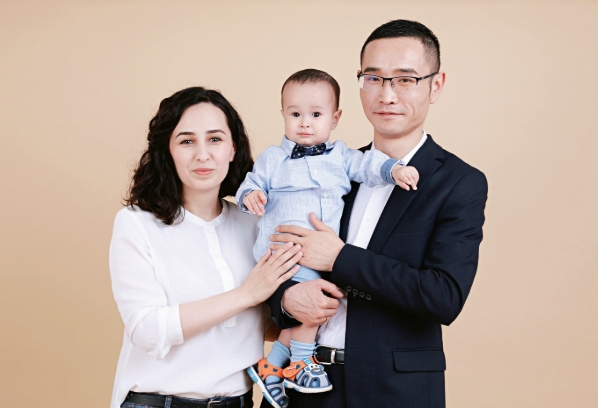Mutual Respect, Understanding Key to Family Happiness

While riding the wave of entrepreneurship under the Belt and Road Initiative (BRI), Yuan Zhaohui, from Xi'an, capital of Northwest China's Shaanxi Province, has not only fallen in love with Anita Jumekenova, a Kazakh woman, but he has worked with her to build a cross-border, e-commerce business between China and Kazakhstan.
Silk Road City, a cross-border, e-commerce trade company, established by the couple in 2015, has become a "bridge" that helps boost trade between and deepen the friendship of China and Kazakhstan. In 2020, the couple received the Silk Road Friendship Award.
"My transnational marriage has drawn benefits from the development and progress of China. Implementation of the BRI has given profound meaning to my marriage, as well as to my career. If marriage means the coming together of two families, then I think transnational marriage means the coming together of two countries," Yuan says.
"There are many cultural similarities between China and Kazakhstan, but there are also some differences. We always respect and understand each other, and the cultures of our respective countries. We think that is the key to maintaining family happiness and harmony," Yuan adds.

"I find cultural differences do not affect our communications at all. In fact, it is due to our different cultural backgrounds that we are complementary to each other, both in marriage and in our careers," Yuan continues. At work, Jumekenova is mainly responsible for daily communications with and management of the Kazakh team, as she is familiar with the local conditions and customs of Kazakhstan, and other Central Asian countries.
While developing the company's SRC SHOP social e-commerce platform, Jumekenova gave the project team's members a detailed introduction to the cultures and consumption habits of people in Central Asia. So, in the early stages of development, the operation and language habits of the local people were fully considered, and the page design and operation process were created in line with the aesthetic views and habits of the locals. The shopping platform has proven to be popular among the locals.
When discussing family education, Jumekenova says, "Both Chinese and Kazakh people attach great importance to the education of children, and they insist on creating a good family environment for children, and in cultivating the children's good habits of respecting their parents and elders, caring for juniors, and being ready to help others.
"I have been in China for more than 10 years. I speak Chinese fluently, and I have a high recognition of Chinese culture. I combine the cultures and language habits of the two countries, I create different learning environments for our child, I guide him to learn the different etiquette, customs and values of China and Kazakhstan, and I help him build cross-cultural communication skills," Jumekenova adds.
Every year, the couple takes their son to Kazakhstan for a few months, so he can experience the Kazak culture, customs and language.

Yuan and his family usually spend Spring Festival in China. During Spring Festival, they paste Spring Festival couplets, make dumplings, eat a New Year's Eve dinner, and visit popular tourist destinations in Xi'an, such as the Grand Tang Dynasty Ever Bright City and Xi'an City Wall, to watch the lantern shows.
They celebrate New Year's Day every year in Karaganda, Jumekenova's hometown in Kazakhstan. "Kazakhs believe celebrating festivals will bring them wealth and good luck throughout the year, and all diseases, misfortunes, and disasters will avoid them," Yuan says.
Travel between Xi'an and Kazakhstan has become more convenient since April 21, 2023, when the first flight on a new route, from Xi'an to Astana, capital of Kazakhstan, took off in Xi'an. It became the fourth direct-passenger route between Xi'an and Central Asia established in 2023, after establishment of routes to Almaty (in Kazakhstan), Bishkek (capital of Kyrgyzstan), and Tashkent (capital of Uzbekistan).
"My wife and I are happy to enjoy the direct flight between Xi'an and Astana. Previously, we had to first fly from Xi'an to Chengdu (capital of Southwest China's Sichuan Province), then take a flight to Kazakhstan. The opening of the direct flights has greatly facilitated our travel, and has helped us develop trade between the two countries," Yuan says.
Silk Road City now has 51 employees, at home and abroad, and it has a branch company in Karaganda. The company is mainly engaged in retail e-commerce of exports and imports of agricultural products.
"We are lucky to have been able to enjoy many preferential policies, thanks to the BRI. With convenient logistics and transportation, by Chang'an China-Europe freight train service, we have more confidence and ability to deal with growing orders," Jumekenova says.
"In the future, we will continue to upgrade our overseas warehouses, establish an agricultural and sideline products trading center in Kostanay, Kazakhstan, and expand our business in more countries along the Silk Road," Yuan says.
Photos from Interviewee
(Women of China English Monthly February 2024)
Please understand that womenofchina.cn,a non-profit, information-communication website, cannot reach every writer before using articles and images. For copyright issues, please contact us by emailing: website@womenofchina.cn. The articles published and opinions expressed on this website represent the opinions of writers and are not necessarily shared by womenofchina.cn.?

 京公綱安備 11010102004314號
京公綱安備 11010102004314號